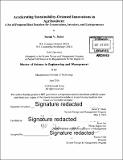| dc.contributor.advisor | Jason Jay. | en_US |
| dc.contributor.author | Nolet, Sarah V | en_US |
| dc.contributor.other | Massachusetts Institute of Technology. Engineering Systems Division. | en_US |
| dc.date.accessioned | 2017-03-20T19:42:12Z | |
| dc.date.available | 2017-03-20T19:42:12Z | |
| dc.date.copyright | 2016 | en_US |
| dc.date.issued | 2016 | en_US |
| dc.identifier.uri | http://hdl.handle.net/1721.1/107605 | |
| dc.description | Thesis: S.M. in Engineering and Management, Massachusetts Institute of Technology, School of Engineering, System Design and Management Program, Engineering and Management Program, 2016. | en_US |
| dc.description | Cataloged from PDF version of thesis. | en_US |
| dc.description | Includes bibliographical references (pages 84-89). | en_US |
| dc.description.abstract | The agribusiness industry is under pressure and on the brink of transformation. The current environmental and social impacts of the agribusiness industry are huge, increasingly visible, and problematic. Demands on this system are increasing as the population grows, urbanizes, and demands more protein, healthier food, and more transparent supply chains. Yet simultaneously climate change, decreasing quality and availability of natural resources, and tougher standards on the use and environmental impact of agrochemicals are constraining supply. Together, these demand drivers and supply constraints create an urgent need for economically viable innovations that deliver environmental and social benefits. Corporations, investors, and entrepreneurs are currently trying to accelerate these sustainability-oriented innovations (SOIs) in various ways. Agribusiness corporations are losing market share, and in response are deploying strategies such as M&A, R&D, and updated internal processes (e.g., marketing, CSR, cost cutting) in a desperate attempt to become more innovative. Investors see an opportunity for financial returns and/or positive impact, and are therefore deploying increasing amounts of capital to accelerate technologies that address the above supply/demand challenges. Entrepreneurs have noticed that consumers no longer trust "Big Food", and see this an opportunity to create a better food system through innovation. It is not clear, however, if these strategies are sufficient. Further, if they are not sufficient, it is crucial to identify gaps and propose solutions. This study, through semi-structured interviews and review of academic and gray literatures, analyzes the current strategies of corporations, investors, and entrepreneurs to accelerate agribusiness SOIs. After identifying where existing approaches are insufficient, I propose a series of solutions- in the form of best practices for each stakeholder- that address the identified gaps and challenges. By identifying and addressing the limitations of current approaches, corporations, investors, and entrepreneurs can more effectively accelerate SOIs and improve the environmental and social impacts of the agribusiness industry. | en_US |
| dc.description.statementofresponsibility | by Sarah V. Nolet. | en_US |
| dc.format.extent | 94 pages | en_US |
| dc.language.iso | eng | en_US |
| dc.publisher | Massachusetts Institute of Technology | en_US |
| dc.rights | MIT theses are protected by copyright. They may be viewed, downloaded, or printed from this source but further reproduction or distribution in any format is prohibited without written permission. | en_US |
| dc.rights.uri | http://dspace.mit.edu/handle/1721.1/7582 | en_US |
| dc.subject | Engineering and Management Program. | en_US |
| dc.subject | System Design and Management Program. | en_US |
| dc.subject | Engineering Systems Division. | en_US |
| dc.title | Accelerating sustainability-oriented innovations in agribusiness : a set of proposed best practices for corporations, investors, and entrepreneurs | en_US |
| dc.type | Thesis | en_US |
| dc.description.degree | S.M. in Engineering and Management | en_US |
| dc.contributor.department | Massachusetts Institute of Technology. Engineering and Management Program | en_US |
| dc.contributor.department | System Design and Management Program. | en_US |
| dc.identifier.oclc | 974913610 | en_US |
